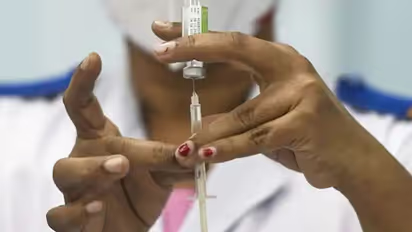UK study reveals Delta variant can be easily transmitted by vaccinated people

Synopsis
The researchers emphasised that this did not diminish the case for immunisation as the best approach to reduce severe sickness caused by Covid-19 and that booster vaccination was necessary.
British research published on Thursday indicated that the Delta coronavirus might readily spread from vaccinated persons to their home contacts, albeit contacts were less likely to get ill if they were vaccinated. The Imperial College London research shows how the highly transmissible Delta form can spread even in vaccinated people. The researchers emphasised that this did not diminish the case for immunisation as the best approach to reduce severe sickness caused by Covid-19 and that booster vaccination was necessary.
Infections cleared up faster in the vaccinated, although the peak virus load remained identical to the uninfected. According to Dr Anika Singanayagam, co-lead author, "we observed that vaccinated people might get and pass on sickness within households, even to vaccinated household members, by obtaining repeated and frequent samples from contacts with Covid-19 cases." She went on to say that our findings offer insight into why the Delta variant continues to generate considerable Covid-19 case numbers across the world, even in countries with high immunisation rates.
Also Read | US study reveals COVID-19 vaccine 1st dose can boost mental health, Indian doctors affirm
The research, which included 621 individuals, discovered that 38% of unvaccinated household contacts of patients with Delta Covid-19 infection went on to test positive, compared to 25% of vaccinated contacts. According to the authors, vaccination contacts who tested positive for Covid-19 had gotten their doses on average more recently than those who tested negative, indicating diminishing immunity and supporting the need for booster vaccinations.
Imperial epidemiologist Neil Ferguson said the transmissibility of Delta meant that Britain would not be able to achieve "herd immunity" for long. He predicted that if the epidemic's current transmission peaks and then begins to decline in the following weeks, we will have achieved herd immunity, but it will not be permanent. He went on to say, "Immunity fades with time, it is incomplete, so transmission occurs, and that is why the booster programme is so vital."
Also Read | COVID can negatively impact mental health, quality of life: Study